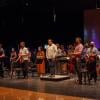
Thankfully, the COVID fog cleared just enough for the Cabrillo Festival of Contemporary Music’s 60th-anniversary season, live and in person again. It’s a notable achievement for this resourceful and important advocate for contemporary music on the West Coast, which has marshalled its forces for two weekends of performances at the historic downtown venue of the Santa Cruz Civic Auditorium.
Even when the new pieces, many of them West Coast (if not world) premieres, sound bold yet shy of complete or not totally settled in their skins — as witnessed at the Saturday and Sunday evening concerts on the first weekend of the festival — the general progressive spirit here instills hope for the future and the unfolding “now” of contemporary music.
Special attention was duly placed on composers of color and works by women, and on Sunday, the spotlight turned toward the now-established but always adventurous a cappella group Roomful of Teeth.

Saturday’s orchestral program, firmly led by Music Director Cristian Măcelaru and dubbed “Let Me See the Sun,” for the piano concerto of the same name by Paola Prestini, made a musical and social commentary on the cracks and inequities in the American condition. Puerto Rican-born, New York-based composer Iván Enrique Rodriguez’s fiery and questioning orchestral tone poem A Metaphor for Power takes its title from James Baldwin — but softens the impact by removing a word from the original phrase (“White is a metaphor for power”). Introducing the work, the composer explained that the idea pertained to the racist hierarchies he found while trying to establish himself in the still largely white-powered classical music world.
In musical terms, the score opens with a sonic bang and settles warily into a matrix of overlapping energies and gestures. Fleeting washes of melody drift through, as does a warped quote from “America the Beautiful,” but lined with more indignation than Charles Ives would have given it. Moments of clangorous discord ease into a fuzzy-edged heroism, closing with a fractured fragment of “The Star-Spangled Banner,” flung into the finale with an overly ham-fisted gusto. A bit more subtlety would have empowered the overall statement, but the musical experience was gripping on its own terms.
Prestini’s piece, written for pianist Lara Downes and given its virtual premiere a year ago, refers loosely to the recent national frictions of the #MeToo and Black Lives Matter movements. As the composer explained before the live premiere, her aim was to embody both conflict and accord in the dialogue between piano and orchestra, while ultimately opting for optimism by embracing an innate “us” in the act of collaboration. That dramatic shift was evident in her musical design, which oscillates between simmering tensions, muscular bursts, and peaceable resolutions.

Stacy Garrop’s The Battle for the Ballot takes as its subject the 19th Amendment and the heroic struggle for the rights of women and Black citizens to vote, replete with Valerie Joi’s narration of texts by formidable spokeswomen of a century ago. The music itself had the feel of a competent soundtrack for a documentary or feature film, skillfully rendered but seeming a bit out of place in this festival’s context.
John Harbison, the senior presence on the program, came through with the most powerful and mature piece of the night, his 2007 The Great Gatsby Suite, distilled from his 1999 opera. Here, the orchestra, adorned with banjo and other items from the early jazz musical toolbox, was at its finest, navigating the alternating period-piece elements and stirring Stravinskian sounds from Harbison’s orchestral palette.
The juxtaposition of cheerful, escapist abandon and reckoning dissonant forces plays up the alternating currents of Fitzgerald’s Gatsby saga. In Harbison’s dual-personality music, the darker side of the American dream comes to the fore, a running theme in the evening’s program.
Sunday night, happily spent with Roomful of Teeth, spanned a gamut of expressive and emotional turf, as expected from this stellar vocal ensemble. A first half of songs from The Ascendant, a project by Wally Gunn with texts by Maria Zajkowski, plumbed a fascinating terrain to the left end of the art-pop music spectrum, an impression fortified by the driving presence of drummer Andy Meyerson.

But it was in the second, a cappella half of the concert that the group hit its unique stride and found the deeper voice in its still-evolving identity, which has come a long way since its 2009 founding. Sophisticated and inventive ideas in vocal music are embedded in RoT’s fabric, as evidenced by a handful of compositions: the diversified directions of Missy Mazzoli’s Vesper Sparrow (2012), a provocative vocal gesture from composer Peter Shin’s bits torn from words (2019), and the highlight — RoT member and master new-music explorer Caroline Shaw’s The Isle (2016), based on Shakespeare’s The Tempest.
For old time’s sake, the group called on the first piece written for it, Judd Greenstein’s minimalism-fueled AEIOU, with an encore of Alev Lenz’s ethereal “Fall Into Me,” one of several moments in the concert conscientiously channeling the influence of early choral music.
Somehow, hearing these tautly integrated parts in the ancient context of conjoined voices and with a well-honed and personal ensemble sound — in the vibrant and very live setting of the Santa Cruz Civic — triggered a bold impression of renewal. Music is back. The Cabrillo Festival is back.




